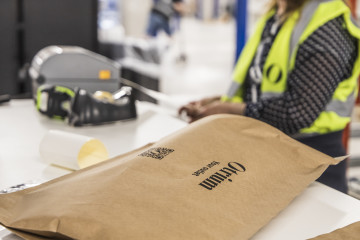Conscious
Conscious Series: ESPRIT

"Everyone who takes an active step towards sustainable living is working towards the common goal – which is to preserve our planet. It can be in the form of being a more conscious shopper and avoiding overconsumption."
14 DECEMBER 2022
At Otrium, we are committed to a fashion industry where all clothing is worn. Our mission is to place unsold fashion items in the wardrobes of those who will actually wear it. This means we try to limit the clothing that ends up in landfills. We are looking to highlight brands in a positive way and help our customers make more informed choices.
This month, we meet Jennifer Lui, the Vice President of Public Relations and Sustainability at ESPRIT.
Where did the journey of ESPRIT begin?
“ESPRIT was founded in California by environmentalists Susie and Doug Tompkins in 1968. Ever since then, we have continuously strived towards creating authentic fashion with mindfully designed collections’’.
Sustainability: what does it mean to you?
‘’I personally believe that it takes a comprehensive understanding of sustainability to generate a lasting impact that benefits people and the planet. We need both private and public sectors to invest in sustainability initiatives and develop concepts, just as we need every individual and consumer to promote more conscious decisions in all aspects of life.’’
Can you tell us more about the more conscious fabrics you are using?
“In May 2018, we committed to the Roadmap Towards Responsible Viscose as outlined by the Changing Markets Foundation. In order to responsibly source cellulosic fabrics, it needs to come from properly managed forests, instead of endangered or old-growth forests. In 2015, we partnered with the environmental non-profit organization called Canopy. Through this initiative, we are able to ensure our cellulose fibers are not sourced from at-risk or old-growth forests.”
Viscose is also known as biobased silk. Silk is made out of animal fibers, whereas viscose is made from bio-based fibers. Viscose is made from wood pulp, typically from trees such as pine, beech, and eucalyptus.The name is derived from the word “viscous”, where cellulose fibers are transformed into viscose using a viscous liquid.
“Recently ESPRIT became a contributor to the Organic Cotton Accelerator (OCA). OCA is an organization that aims to create a better, more transparent, and responsible organic cotton supply chain. The organization wants to do this by improving the livelihoods and incomes of farmers while educating them on new practices that are less harmful to the earth.”
OCA runs different programs, such as seed, farm, and innovation programs, where a global collective with brands, retailers, supply chain partners, civil society organizations, philanthropic foundations, and academics are united to help with to reach these goals.
“Cotton makes up more than half of the Company’s total fiber usage. To secure the future supply of this raw material, ESPRIT is exploring in-conversion projects that support conventional cotton farmers’ transition to certified organic cotton. Working with OCA, we aim to ensure farmers have committed procurement and receive premium payments as well as participation in training and development using best practice methods across organic farming.”
What achievements are you most proud of?
“Our commitment to contributing to a circular fashion-industry puts focus and priority on extending the product life of our clothing. I am proud of ESPRIT’s collection of timeless, high-quality versatile pieces. It is perfect for someone who likes to mix and match, just like I do.
Acting responsibly in all aspects of our business and being committed to respecting human rights contribute to our long-term success at ESPRIT. Examples are our Code of Conduct and transparent stakeholder engagement. We’re striving to operate responsibly along the entire value chain, by safeguarding the rights of our employees and the workers who manufacture our products.”
What are you working on at the moment?
“Our most recent project is the ESPRIT Futura Hub. We recently opened three hubs in New York, London, and Amsterdam. The three ESPRIT Futura hubs aim to create transformative change in culture, mindset, and business process, discover new growth opportunities for ESPRIT, and improve innovation performance.”
What is the biggest challenge on the roadmap of improvements for you at ESPRIT?
“Calculating carbon footprint is not an easy task, as ESPRIT works with external production partners only. In 2021, we rolled out its data system to retrieve carbon footprint data from all our suppliers, based on ESPRIT’s production volume. These so-called Scope 3 emissions are by far the majority of the brand’s footprint.
Together with our suppliers and partners, ESPRIT is working on solutions to improve our footprint. The next step requires the need to consider reduction targets. This will be one of ESPRIT’s biggest challenges within the coming years.”
You are aiming towards circularity at ESPRIT. What are you doing to work towards these goals?
“Circularity is the guiding principle behind ESPRIT’s strategy. We choose high-quality materials and fabrics that are ethically sourced, emphasizing recycled and more sustainable materials. This entails choosing non-synthetic fabrics and natural materials over synthetic, using recycled down feathers instead of virgin feathers, choosing recycled fabrics whenever possible, etc.
We consider whether these materials and finished garments can be recycled or repurposed to give them a second life. When incorporating recycled materials back into the production process, we are supporting a circular economy by reducing the need for more virgin raw materials.”
How do you stay optimistic and persistent in the fight against climate change?
“Everyone who takes an active step towards sustainable living is working towards the common goal – which is to preserve our planet. It can be in the form of being a more conscious shopper and avoiding overconsumption, choosing electric cars over conventional cars, having a greener diet, and encouraging hand-me-down children’s clothing amongst friends. I am quite an optimistic person in general and always believe that success is a result of a collective effort. Fighting against climate change is a collective action.”
Do you have a pro-tip extending the life cycle of your wardrobe – how do you make sure your ESPRIT clothes last for longer?
“To extend the life cycle of your wardrobe, choose brands that invest in making durable products. Another critical action is the way you wash your clothing. Small actions, such as lowering the washing temperature to cut down on overall energy consumption, have a positive impact on the environment.

More from Otrium
See all articles
Conscious
Otrium’s plastic-free shipping pilot
Waste and excess inventory are built into the fashion industry’s model. Not only is waste created during the manufacturing process, but a huge part also comes from packaging and shipping practices. Poly bags play a part in the waste that is created, so we want to find a solution together with you!
Quick glance: The pilotWhat: All orders containing a single item will be shipped without a poly bag in a recycled paper envelopeWhy: Otrium will reduce plastic waste by keeping the poly bags in the loop How: By reusing or recycling the poly bags into high-quality materialWhen: Until January 2023 What you can do: Submit feedback directly to [email protected]
A short story behind plasticA poly bag is a plastic bag around a fashion item that protects it from dirt and water which they possibly encounter during their shipment and in warehouses. Sounds great, doesn’t it?
These plastic bags are great for protecting fashion items, however, plastics are harmful to our environment. Plastic sticks around in the environment for ages, threatening wildlife and spreading toxins. Plastic also contributes to global warming. Almost all plastics are made from chemicals that come from the production of planet-warming fuels (gas, oil, and even coal).
Plastic is a collective name for multiple materials and compounds that each have unique properties. You might have heard about PET (Polyethylene Terephthalate) which is often used for soda bottles or polyester which can be found in the composition of many fashion items these days.
Many types of plastics can be recycled at a high-quality level. This can be done only by recycling the same type of plastic in one stream. Unfortunately, plastic waste is collected often as one waste stream rather than separating the different types of plastics. As it’s difficult to sort these plastics after collecting them, the result is recycling to a downgraded material in most cases.
The majority of poly bags in the fashion industry are made from a plastic material called LDPE (low-density polyethylene). Hundreds of billions of polybags are produced for the fashion industry every year, and it is estimated that most of them go to waste. To recycle the poly bags on a high-quality level, they should be sorted and recycled as a separate stream of LDPE.
Otrium wants to make sure that the plastic of the poly bags stays in the loop and keeps its quality. Either by reusing the poly bags or recycling them into new high-quality material. We don’t want to put the burden of recycling the poly bag on our members. Instead, we want to keep the bags in our warehouse and in our loop. By taking off the poly bag before shipping we can create the potential of a waste stream where the poly bags can be reused or recycled into high-quality LDPE material again.
Interesting fact: The poly bags of Otrium are made out of 100% recycled LDPE.
Our responsibility At Otrium, we’re constantly working on making the fashion industry smarter and less wasteful. It’s our job to keep improving our practices in order to become a more conscious platform. Being aware of the environmental impact of plastics, we want to take responsibility and keep them in the loop. Empowered by our members who expressed their openness to receive items without a poly bag, we want to test ways of plastic-free shipping.
The purpose of this pilot is to reduce our plastic waste and to get a step closer to closing. We will be removing the poly bag from the items right before shipping them to you. This way we keep the poly bags in our warehouse which makes it possible to reuse or recycle them ourselves. The poly bags we will keep, keep their value since they are recycled with the same type of plastic. This will ensure high-quality plastic recycling.
We will collect customer feedback and evaluate if shipping with a paper envelope is enough coverage to secure the item shipped. Only together with our members, we can figure out new ways of plastic-free shipping and improve our practices. Want to know more? Read our FAQ undefined!
Schrijf je in voor onze nieuwsbrief
Ontvang de nieuwste kortingen, merken en drops.
Otrium
Klantenservice
Klantenservice
© 2016-2026 Otrium, behalve bepaalde inhoud geleverd door derden
